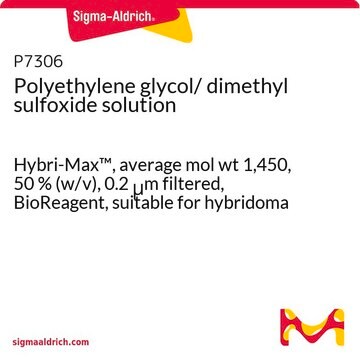8.07489
Poli(etilenglicol)
1500, for synthesis
Sinónimos:
PEG
About This Item
Productos recomendados
vapor pressure
<0.01 hPa ( 20 °C)
Quality Level
form
solid
autoignition temp.
420 °C
potency
28000 mg/kg LD50, oral (Rat)
>20000 mg/kg LD50, skin (Rabbit)
pH
4-7 (20 °C, 100 g/L in H2O)
mp
43-49 °C
transition temp
flash point 260 °C
solubility
650 g/L
density
1.2 g/cm3 at 20 °C
bulk density
400‑500 kg/m3
storage temp.
2-30°C
SMILES string
C(CO)O
InChI
1S/C2H6O2/c3-1-2-4/h3-4H,1-2H2
InChI key
LYCAIKOWRPUZTN-UHFFFAOYSA-N
¿Está buscando productos similares? Visita Guía de comparación de productos
Application
- A plasticizer in the synthesis of polylactic acid/talc composites to improve the crystallinity and mechanical properties of the material.
- A non-ionic surfactant in the preparation of organoclays.
- A reactant in the synthesis of quasi-prepolymers by reacting with a polymeric 4,4′-diphenylmethano diisocyanate (pMDI) via the pre-polymerization method.
PEG-1500 can also be used in the aqueous two-phase extraction system along with inorganic salts (sulfates, carbonates, and ammonium phosphates) for the separation and extraction of both organic (amino acids and vitamins) and inorganic substances (metal salts).
Analysis Note
Melting range (upper value): ≤ 49 °C
Hydroxyl value: 70 - 80
Average molecular mass: 1400 - 1600
Identity (IR): passes test
Storage Class
11 - Combustible Solids
wgk_germany
WGK 1
flash_point_f
Not applicable
flash_point_c
Not applicable
Certificados de análisis (COA)
Busque Certificados de análisis (COA) introduciendo el número de lote del producto. Los números de lote se encuentran en la etiqueta del producto después de las palabras «Lot» o «Batch»
¿Ya tiene este producto?
Encuentre la documentación para los productos que ha comprado recientemente en la Biblioteca de documentos.
Los clientes también vieron
Nuestro equipo de científicos tiene experiencia en todas las áreas de investigación: Ciencias de la vida, Ciencia de los materiales, Síntesis química, Cromatografía, Analítica y muchas otras.
Póngase en contacto con el Servicio técnico


